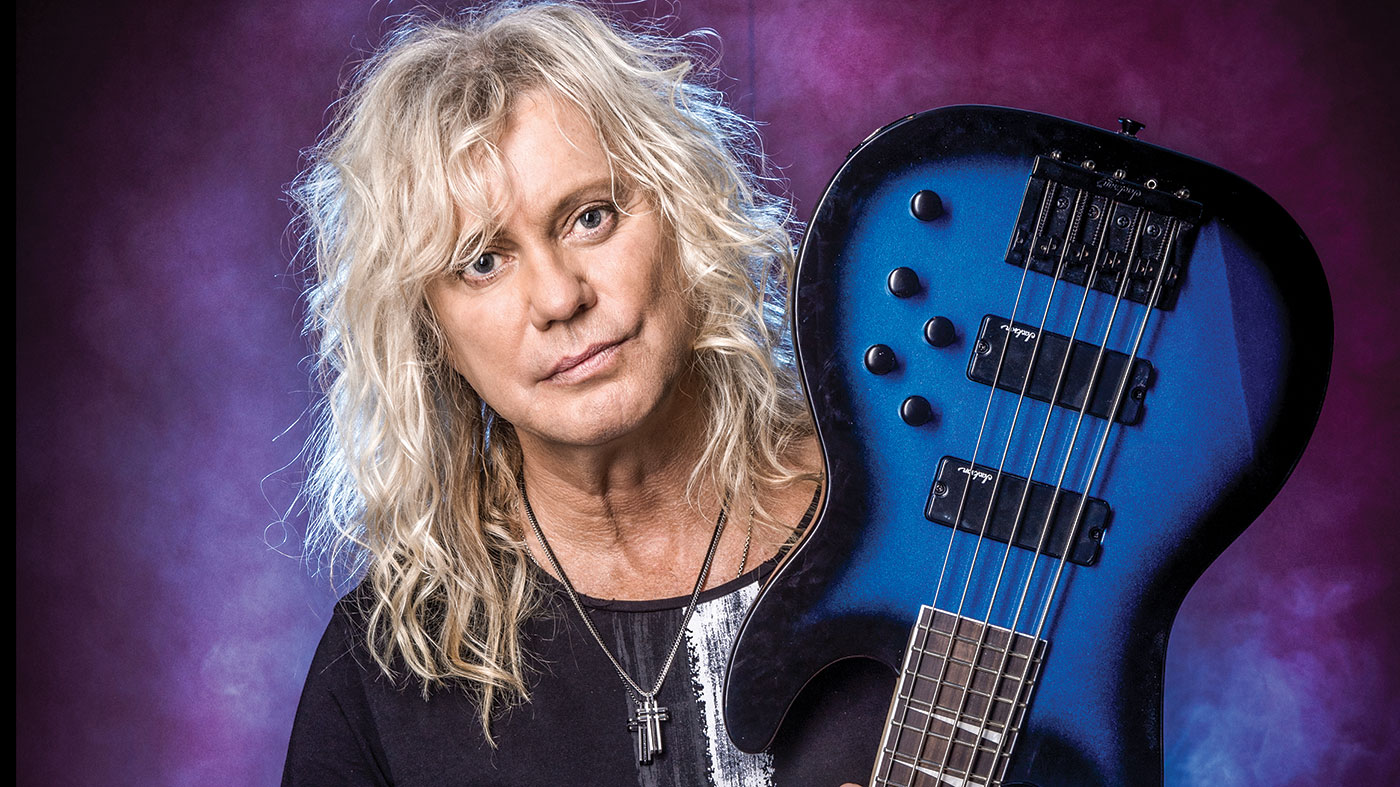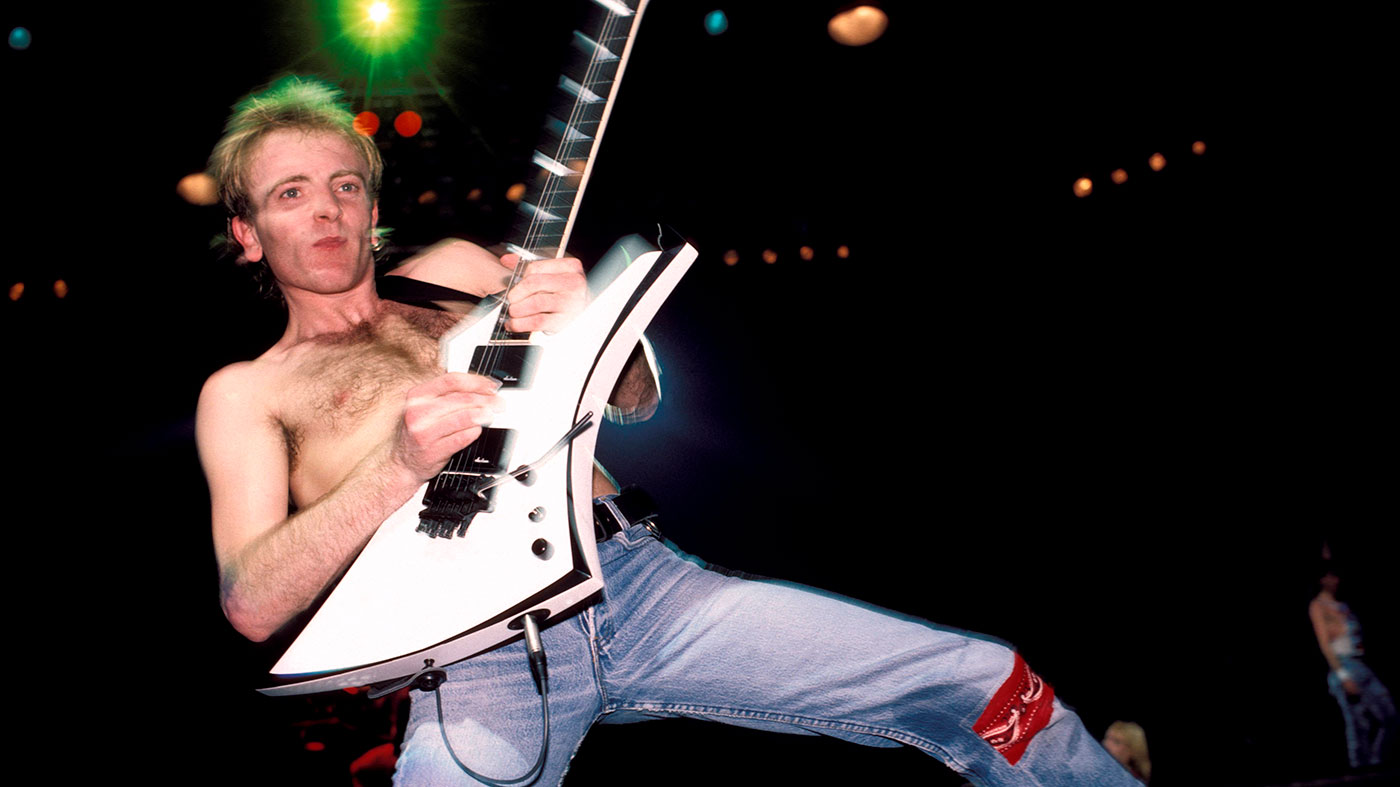Def Leppard's Rick Savage: “As a bassist, you should be the perfect bridge between the rhythm and the colour”
Savage speaks on Hysteria, timing and tone

Want all the hottest music and gear news, reviews, deals, features and more, direct to your inbox? Sign up here.
You are now subscribed
Your newsletter sign-up was successful
Heavy rock. Heavy metal. Pop-rock? Def Leppard bassist Rick ‘Sav’ Savage has heard it all, played it all and sold millions of copies of his band’s music. whatever it is, it has enduring power.
Def Leppard’s Rick Savage had already been on holiday and settled back in Dublin, where he was living in 1987, when he got the phone call from singer Joe Elliott requesting his presence back at Holland’s Wisseloord Studios - for one last-minute addition to their fourth studio album, Hysteria.
The song in question, Pour Some Sugar On Me, would prove to be one of the biggest guitar-driven singles of its era and set the rising Sheffield rockers to globe-dominating heights.
Pour Some Sugar On Me happened because Mutt Lange heard something there that the album didn’t have
“As far as I was concerned, I had retired and washed my hands of the album, awaiting news of how the mixes were going,” chortles Savage, on a rainy afternoon at his record label’s HQ in Kensington, London.
Seated in the recording studio downstairs, surrounded by a maze of faders as well as stacks of pedals and vinyl, it seems a fitting environment to meet with a founding member of such a production-led band…
“It all happened because [legendary rock producer] Mutt Lange heard something there that the album didn’t have,” continues Savage, with a typically open and honest Yorkshire drawl.
“We reconvened back in the studio and finished the song in about four days… which is interesting, considering the album took five years to make! You can imagine how happy the label were to hear we were recording another song, ha ha!”
Want all the hottest music and gear news, reviews, deals, features and more, direct to your inbox? Sign up here.
Now celebrating its 30th anniversary, Def Leppard’s fourth full-length stands as one of the finest rock releases of all time - a perfect storm of futuristic production, earworm melodies, gripping chord movements and tasteful technicalities.
Despite the long, hard road to get there - setbacks including drummer Rick Allen losing his left arm following a car accident - and with no fewer than seven hit singles, from synth-driven anthems like Women and Rocket to the album’s title ballad, Hysteria turned the Sheffield quintet into the biggest rock band in the world. All these years later, they’re still up there, headlining festivals and stadiums wherever they roam.
Hysterical
“Making rock music is just our instinct,” reveals Savage, when asked about the magic behind these chart-conquering rock epics.
“But it was coming up with songs and arrangements that transcended the rock attitude, without straying from the format, that made Def Leppard. We got into a mind space of not writing verses that went straight to the chorus, which bands still do today. I’d say we almost pioneered the idea of tricking people into thinking they were hearing a chorus before it would actually come.
We never wanted to be fashionable. We didn’t go out of style because we were never there in the first place!
“We’d have a bucket full of great eight-bar ideas and someone like Mutt, with the mental proficiency and bigger picture, would know which of them to glue together - sometimes creating progressions or key changes you never would have naturally written. These different ideas on offer created something above the norm. Quite often it didn’t work, it would sound bloody stupid…”
He trails off and pauses for a second. “But when it did work, it was unbelievable!” he continues, with a boyish grin.
“Animal is a great example, where you get locked into these Bb, C and D chords and then all of a sudden everything moves up a semitone, which catches your attention. It would somehow lead naturally into the chorus, ending with an A chord then go back to Bb, which makes you go ‘What?’ but in a nice way. It’s not being musically different for the sake of it.
“We never wanted to be fashionable - even when we were semi-fashionable, the intention was never like that. We didn’t go out of style or out of the cool list because we were never there in the first place! Even now, we’re not sure what kind of image to project or what we should be wearing. We’ve always been uncomfortable with that, to a certain extent. But give us an acoustic guitar and a piano, and we’re completely at home… we’ll write you a couple of songs in an hour!”
Being one of the songwriters, and even playing guitar on the album’s title track (“the others didn’t have the right feel, so Mutt said, ‘It’s your riff - you play it!’”) gave Savage a birds-eye perspective of what was required from him to make Hysteria’s 12 songs the very best they could be. From the off, Def Leppard set out to make their ‘greatest hits’ in just one standalone release and their mission was a resounding success - thanks to knowing how to play on their strengths.
Out of the limelight
“You can’t have everybody fighting for the spotlight,” says Savage, shaking his head. “For example, for those first six Queen albums, I was one of their biggest fans on Earth. John Deacon is right up there for me - with a brilliant mix of melodic lines that never ever trampled on the song. Similarly, I always felt Sting was great for that too, because he let the song breathe without going overboard. It helped that he was the singer, because I think he was more conscious of not walking over his vocal ideas.
Sometimes I see someone digging in on the bass too much and feel like they’re at the wrong gig
“As a bassist, you should be the perfect bridge between the rhythm and the colour,” Savage reflects. “That’s just doing your job and all anyone can ask for. I’d probably be the least important member from an individual point of view - I’ve always felt if I can make the guitars sound as good as possible, I’m happy. People want to hear the harmonies and the lead singer.
“Sometimes I see someone digging in on the bass too much and feel like they’re at the wrong gig. As I’m a guitar player myself, I can think, ‘How would I want my bassist to play this?’ If that means staying on a groove and not moving much melodically, then do it… because two guitar players can sound amazing.”
To some of the more technically ambitious players out there, that may perhaps sound like sacrilege, but for Savage, the song always comes first - and it’s a formula that’s been working out well for him for quite some time. Then, of course, there are the other advantages that come hand-in-hand with the ‘less is more’ approach…
“Some of the stuff we do is very simple on paper. The melody doesn’t move,” he shrugs. “I might be playing an A note for 16 or 24 bars, so I’ll be waving at the crowd with my free hand, just gesturing to people. It’s a bit more showman-like, because I would get awfully bored doing it stood by the hi-hat. I’ve got to have fun!
“As a result, I’m a very aggressive player. I hold the plectrum in such a way that it almost scratches the string. It’s not a clean pluck, more like a scrape, so when you play eighth notes, you get the bottom-end and a sheen on top - almost like a bass keyboard. It’s a little more rounded and bigger.”

I'm going to Jackson
Having reissued their bestseller earlier in the year and now with plans to perform the album in its entirety over 2018, Steel City’s finest are gearing up for big things.
On stage, they’ve never cared for the variables. The Def Leppard live experience is one built on consistency, which is why their bassist eschews advanced circuitry or spaceship pedalboards in favour of a more streamlined and dependable signal path. For the best part of a decade, he’s been using Jackson five-strings, most notably his custom white, grey and black negative Union Jack XB925.

Def Leppard's Phil Collen: “We worked. We went somewhere. I came out of Hysteria a better player”
“We have a lot of live presets, so I don’t want to be tied down to a pedalboard. I’d probably be crap at it,” he chuckles.
“If anyone’s gonna fuck up, I’d rather someone else get the blame. I think a lot of bass players are more artistic than I would be from a musicianship point of view. I’m not one to think, ‘It’s a slightly brighter hall tonight, so I’d better mess with the EQs!’ Let the guy out front worry about that - we’ve got the best in the business!
“The two main Jackson guitars I use are just a piece of wood, electrified. It’s way less complicated and our sound engineer prefers them too. It came through an association via Phil [Collen, Leppard guitarist], because he’s used their guitars for a long time. I fell in love with the five-strings straight away - the neck wasn’t overly demanding. Some bass necks get a bit too broad, and I don’t have the biggest fingers. It was as simple as saying, ‘I love it, can you make me some more?’”
The rest of the tone comes from the Gallien-Krueger Fusion 550 heads, fed into two 4x10s, one on each side of Rick Allen’s kit. In fact, nothing has changed with Savage’s rig for a good few tours, the bassist being the first to admit he might go through an entire run without even looking at what he’s plugged into. Why bother, when there’s so little to go wrong?
“I’m not an anorak,” he chuckles. “If it sounds good to my ears, that’s what I’ll stick to. Two of those GKs is more than enough. I like the spectrum of sound you instantly get with them, regardless of where the EQ is set. Straight out of the box, there’s a roundness to it, you feel like the tone is complete. There are no nasal frequencies that mess with the stage sound, it’s very smooth because nothing needs to jump out.”

Kick flip
This perhaps explains why the list of people that have seen Savage ditch the pick and use his thumb is very, very short indeed.
“I wouldn’t use my thumb live - for one, I’m not good enough,” he confesses modestly. “I don’t have that technique and it would be a sound engineer’s worst nightmare just because of the inconsistency of sound. That might change in the studio: like on our [1996] Slang album, there’s a song called Blood Runs Cold which is all fingers and thumbs.
One bit of advice for anyone struggling with that is not to listen to the snare drum. Just listen to the kick
“I’ll do it to get that dead sound behind the note, but I’d play those songs differently in front of an audience, I’m not going to stand there Jaco Pastorius-style and get it technically right with everyone looking at me. I’d feel inhibited with people studying what I’m playing. It’s all horses for courses; you develop your own style, and everyone’s opinion of good will differ. People will like you for different reasons. I like Billy Sheehan for different reasons to John Deacon… but they’re both bloody great!”
Having made his thoughts clear on musicians overstepping the mark and losing sight of the more collective goal when performing, one can’t help but wonder where else Savage sees bass players going wrong. What are the common pitfalls?
“The main area where bass players go wrong is timing,” he says, appropriately as today’s interview is drawing to an end.
“It’s absolutely about having an internal clock that’s correct in itself, within the boundaries of good taste and good feel, and able to lock in with the drummer. When you’re younger, you tend to be grasping the concept of playing a good ‘feel’ groove, like playing on the back end. You tend to want to rush through to the next section, rather than sit on it.
“One bit of advice for anyone struggling with that is not to listen to the snare drum. If you concentrate on that, you’ll push it and push it, the drums might try to keep up and you’ll lose your groove and sexiness. Just listen to the kick. If your psyche is in touch with that, the snare will fall into place. Forget everything else and ingrain that kick pattern in your head - even if you try to go out of time, you’ll find it very hard. It’s a weird phenomenon!”
Sound advice indeed from someone with four decades of top-level experience behind them. And looking ahead to a very big and busy 2018, the hysteria around Def Leppard looks set to rocket further still.
Hysteria: 30th Anniversary Edition is out now on UMC.


Amit has been writing for titles like Total Guitar, MusicRadar and Guitar World for over a decade and counts Richie Kotzen, Guthrie Govan and Jeff Beck among his primary influences. He's interviewed everyone from Ozzy Osbourne and Lemmy to Slash and Jimmy Page, and once even traded solos with a member of Slayer on a track released internationally. As a session guitarist, he's played alongside members of Judas Priest and Uriah Heep in London ensemble Metalworks, as well as handling lead guitars for legends like Glen Matlock (Sex Pistols, The Faces) and Stu Hamm (Steve Vai, Joe Satriani, G3).
